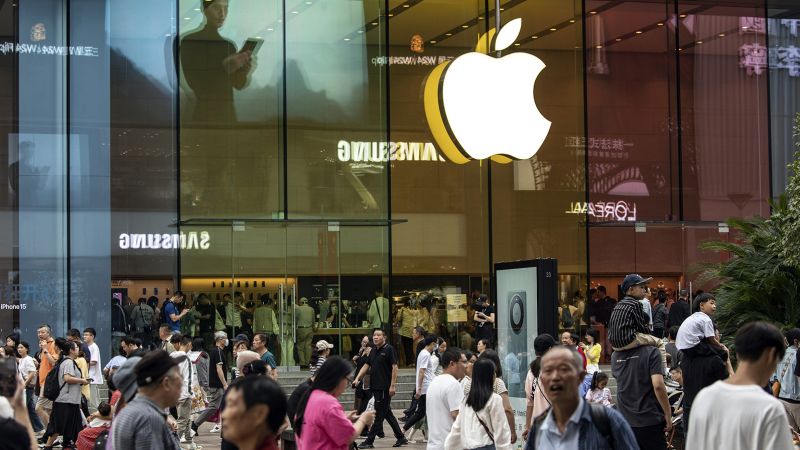Editor’s Note: Sign up for CNN’s Meanwhile in China newsletter which explores what you need to know about the country’s rise and how it impacts the world.
The world’s second largest economy is struggling to attract foreign companies and investments, despite Beijing’s efforts to address its myriad economic challenges, according to new data from China.
A gauge of foreign direct investment (FDI) into China has slipped into the red for the first time since 1998, underscoring the country’s failure to stem capital outflows.
Direct investment liabilities, a measure of FDI, stood at minus $11.8 billion in the third quarter, according to data published by the State Administration of Foreign Exchange (SAFE) on Friday. In the third quarter of 2022, China’s direct investment liabilities was at $14.1 billion.
This is the first time the gauge has turned negative in 25 years, when records began, according to data compiled by Refinitiv Eikon. It suggests foreign companies may be taking their money out of the country, instead of re-investing in their operations.
The SAFE data is organized according to whether an investment is an asset or a liability for China. Direct investment liabilities include profits belonging to foreign companies that have not yet been repatriated or distributed to shareholders, as well as foreign investment in financial institutions, according to the government.
China’s main measure of FDI, which is released by the Commerce Ministry, showed a decline of 8.4% in the first nine months of this year, accelerating from a 5.1% drop in the first eight months.
While rising geopolitical tensions are partly to blame for the exodus, foreign companies and investors have also grown wary of increasing risks in China, including the possibility of raids and detentions.
Vanguard has become the latest company to pull out of the country. The world’s second largest asset management firm after BlackRock told CNN on Monday that it aims to close its Shanghai office after December 2023. The exit was first reported by Bloomberg, citing unnamed sources, on Thursday.
The company said it had sold its stake in its joint venture to local partner Ant Group last month, as part of the exit. Vanguard confirmed to CNN that it had signed severance agreements with around 10 people, its entire remaining staff, in Shanghai.
“Going forward, Vanguard will prioritize its global business in regions in which we offer our own investment products and services,” the company said in a statement.
‘Smoke and mirrors’
Beijing has been seeking to reverse capital outflows in the face of mounting economic challenges. But such efforts appear to have failed to assure investors.
The China International Import Expo (CIIE), an annual event launched by President Xi Jinping in 2018 to portray China as an open market and improve its trade ties, kicked off on Sunday.
But the European Union Chamber of Commerce in China criticized the event last week as a “showcase.”
“European businesses are becoming disillusioned as symbolic gestures take the place of tangible results needed to restore business confidence,” the chamber said in a Friday statement.
“The CIIE was originally intended as a showcase of China’s opening up and reform agenda, but it has proven to be largely smoke and mirrors so far,” Carlo D’Andrea, vice president of the chamber, said in the statement.
Beijing’s other efforts to ramp up economic growth have not yet shown results.
Late last month, China’s legislature approved one trillion yuan ($137 billion) in sovereign bonds to support the economy. The bonds will be used to mainly fund infrastructure projects.
The sovereign wealth fund also bought shares last month to boost the country’s sagging stock market, which is among the world’s worst performers this year.
In September, the Chinese government relaxed capital controls in two of the country’s largest cities — Beijing and Shanghai — to let foreigners move their money freely into and out of the country.
The People’s Bank of China also met with a number of top Western companies that month, including JP Morgan, Tesla and HSBC, pledging to further open up the financial industry and “optimize” the operating environment for overseas companies.
But global investors remain wary of China’s rising scrutiny of Western companies and a structural slowdown, according to analysts.
A September survey by the American Chamber of Commerce in Shanghai showed that only 52% of respondents were optimistic about their five-year business outlook, the lowest level since the survey began in 1999. That compares with 55% in 2022 and 78% in 2021.
Read the full article here




